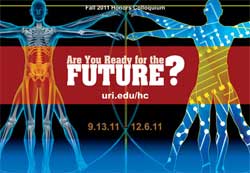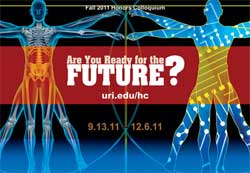 KINGSTON, R.I. – August 30, 2011 – The University of Rhode Island’s popular Honors Colloquium returns this fall to address the astonishing technological advances expected over the next 20-30 years and their affect on humankind. The semester-long lecture series will feature some of the world’s most prominent voices discussing their expectations of what the future holds, the surprising technologies that will likely be available, and the potential consequences of those advancements.
KINGSTON, R.I. – August 30, 2011 – The University of Rhode Island’s popular Honors Colloquium returns this fall to address the astonishing technological advances expected over the next 20-30 years and their affect on humankind. The semester-long lecture series will feature some of the world’s most prominent voices discussing their expectations of what the future holds, the surprising technologies that will likely be available, and the potential consequences of those advancements.
The series leads off on Sept. 13 with an introductory lecture by inventor and futurist Ray Kurzweil, who has long predicted that mind and machine will one day merge. Described as “the restless genius” by the Wall Street Journal, and “the ultimate thinking machine” by Forbes, he will discuss exponential growth and its consequences.
All the lectures in the series begin at 7:30 p.m. in Edwards Auditorium on the URI Kingston campus. They are free and open to the public.
“Technology is increasing our capabilities exponentially in virtually every area of human endeavor, and a linear extrapolation of past trends will grossly underestimate technological capabilities in the not too distant future,” said Peter Cornillon, URI professor of oceanography and coordinator of the colloquium along with Professors Chris Roman and Judith Swift. “We’re not prepared or preparing for the impacts that will result from these technological changes, so this colloquium is designed to begin educating the public about what to expect.”
Kurzweil’s opening lecture will focus on three evolving technologies that he believes are changing our lives: genetics, robotics and nanotechnology. One of the leading modern inventors, he has worked in such diverse fields as virtual reality, optical character recognition, text-to-speech synthesis, speech recognition technology, and electronic keyboard instruments. He is the author of several books on health, artificial intelligence, transhumanism, the technological singularity, and futurism.
Called the “rightful heir to Thomas Edison” by Inc. magazine and one of 16 “revolutionaries who made America” by PBS, Kurzweil received the National Medal of Technology in 1999 and was the recipient of the MIT-Lemelson Prize, the largest prize for innovation. He was inducted into the National Inventor’s Hall of Fame in 2002.
The rest of the speakers in the series are: Author Peter Schwartz on the interplay of geopolitics and technology (Sept. 20); science fiction author Vernor Vinge on what sci-fi writers know about the future (Sept. 27); Anthony Atala, director of the Institute for Regenerative Medicine, on making new organs (Oct. 4); bioengineer Jim Collins on synthetic biology (Oct. 11); URI Professor Jason Dwyer on trends in nanotechnology (Oct. 18); URI Professor Chris Roman and Monterey Bay Aquarium Research Institute chief technologist James Bellingham on robotics use in the ocean (Oct. 25); biological engineer and brain and cognitive scientist Ed Boyden on enhancing the brain — past, present and future (Nov. 1); cognitive scientist Deb Roy and media researcher Johanna Blakley in a panel on social media (Nov. 8); cybersecurity expert Richard Clarke on cyberwarfare (Nov. 15); and Laurie Zoloth, director of the Center for Bioethics, Science and Society, on ethics and genetics (Nov. 29).
The final presentation, entitled “We Are The Future,” will feature URI honors students discussing their vision for the future, informed by their attendance at the lecture series and readings from the Honors Colloquium course.
All of the lectures will be streamed live at www.uri.edu/hc, where the complete schedule of events is also listed.
“With its live and archived broadcast of talks, the colloquium has become a mainstay of a number of other educational groups from high schools to other colleges and universities, from book clubs to more formal continued education centers,” said Swift. “Of course, attendance in person is always an added pleasure.”
For additional information about the URI Honors Colloquium, contact Deborah Gardiner at debg@uri.edu or 401-874-2381.
Major sponsors of the Honors Colloquium are the G. Unger Vetlesen Foundation, the URI Honors Program, and the URI Graduate School of Oceanography, with sustaining sponsors including The Thomas Silvia and Shannon Chandley Honors Colloquium Endowment, The Mark and Donna Ross Honors Colloquium Humanities Endowment and the URI Office of the Provost and Office of the President. Additional support is provided by URI’s Harrington School of Communication and Media, College of Engineering, Classroom Media Services, College of the Environment and Life Sciences, College of Human Science and Services, College of Business Administration, College of Pharmacy, Office of the Vice President for Administration and Finance, University College, Coastal Institute, Division of University Advancement, College of Nursing, College of Arts and Sciences, and Department of Communication Studies.

